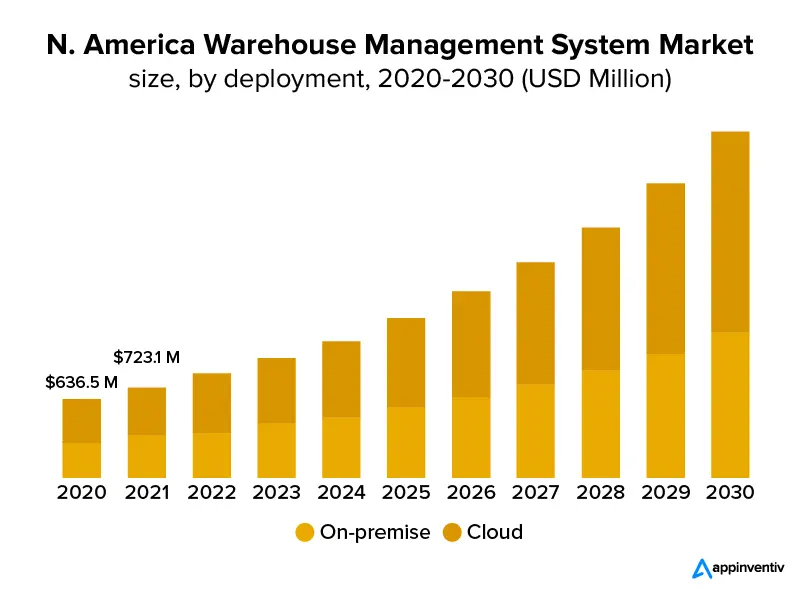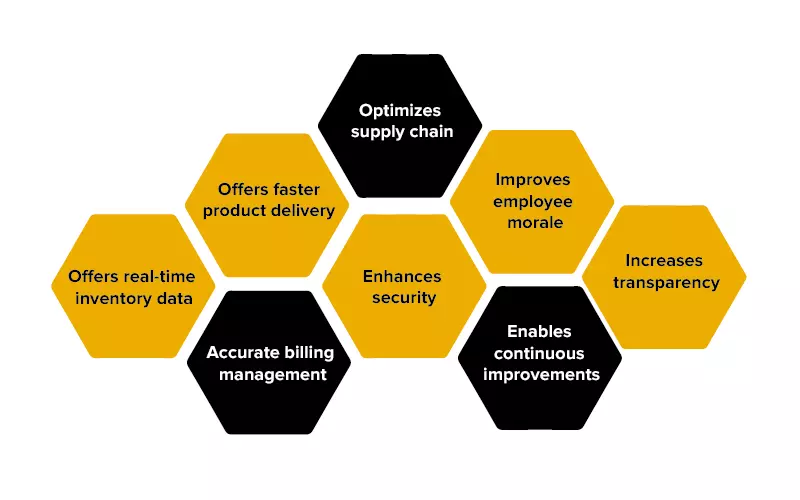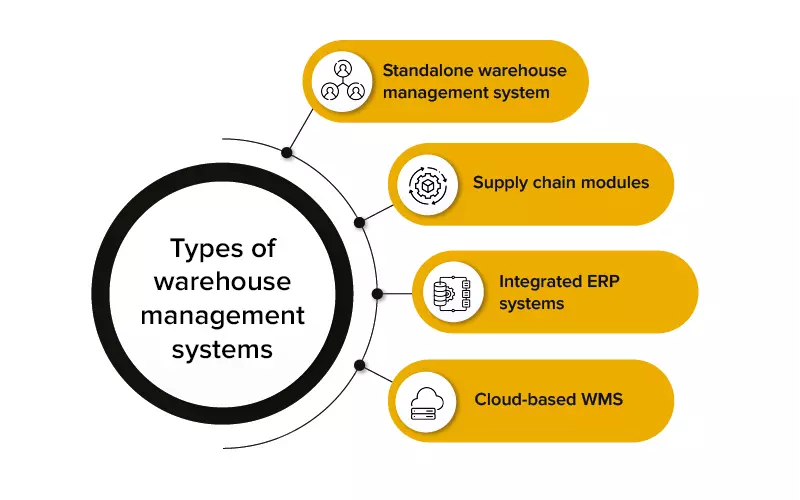- What is a Warehouse Management System?
- Direct benefits of developing a warehouse management system
- Offers real-time inventory data
- Reduces operating expenses
- Accurate billing management
- Improves demand forecasts
- Enables continuous improvements
- Offers faster product delivery
- Enhances security
- Increases transparency
- Optimizes supply chain
- Improves employee morale
- Types of warehouse management systems
- Standalone warehouse management system
- Supply chain modules
- Integrated ERP systems
- Cloud-based WMS
- How to choose the right warehouse management system?
- Budget/ROI
- Functionality
- Vendors
- Understanding warehouse management system cost
- Why is Appinventiv the right choice for your business?
- FAQs
In today’s rapidly evolving economy, efficiently receiving, storing, and shipping products is of the utmost importance. Warehouse owners and operators worldwide are faced with the challenge of providing competitively priced goods to a market that expects speed from the moment an order is placed to the delivery time. As such, the competition to supply and serve the market is more intense. Thus, having a first-class warehouse management system is essential for carrying out seamless business operations.
Managing a warehouse requires great skill and expertise, particularly as e-commerce continues to expand rapidly. Consumers today demand two key elements from the supply chain: immediate product availability and competitive pricing. The most efficient warehouse management systems are designed to effectively combine all warehouse operations, providing the necessary tools to meet these expectations.
Furthermore, smart warehouse management system development can help you harness the power of internal operations. The system is capable of opening multiple avenues of growth opportunities while helping you stay ahead in the rising competition.
According to Grand View Research, the global warehouse management software market was valued at $3,413.9 million in 2022 and is expected to witness a CAGR of 19.0% from 2023 to 2030. Thus, the increasing demand for warehouse management software development has propelled major sectors like healthcare, retail, manufacturing, and more to leverage its benefits, increase their operational efficiency and meet consumer demands in a timely manner.

Coming to the cost of warehouse management software development, the overall budget is expected to vary between $35,000 to $250,000. There are several factors that further affect the cost of development, such as the location of the software development agency, the UI/UX design of the software, features to be integrated into the software, etc.
In this blog, we will dive deep into the benefits of warehouse management system development for your organization. In addition to this, we will discuss the types of WMS for gaining efficiency in the warehouse and delve into the cost of creating warehouse management software in detail.
So, without further ado, let’s get started!
What is a Warehouse Management System?
A Warehouse Management System (WMS) is a type of software that is widely used by organizations to effectively manage and control warehouse operations. This system helps to streamline the processes from the time goods or materials enter the warehouse until they are moved out. In essence, a WMS helps to optimize the functioning of a warehouse, making the workflow more efficient and cost-effective. By utilizing a WMS, organizations can save time and resources, while also improving the quality of their warehouse operations.
A WMS system is extremely important because it tracks all the materials in your warehouse and also creates systems to streamline how workers pick products and pack orders. It allows you to track merchandise entering the warehouse, being packed onto shelves and into various locations, and when it leaves the warehouse for order fulfillment.
A WMS also provides visibility into an organization’s inventory at any time and location, whether in a facility or in transit.
Direct benefits of developing a warehouse management system
A warehouse management system can be a great asset for any business. It can help to speed up order fulfillment, allowing for more efficient operations. Additionally, it can help to keep track of what items are selling well, allowing for more accurate inventory management. Furthermore, it can also help to track raw materials when they come in, ensuring that they are placed in the correct locations for stocking and manufacturing.
Let us look at the key warehouse management system benefits in detail and why it matters for your business.

Offers real-time inventory data
A warehouse management system’s data gives the inventory information to workers whenever they need it. A WMS system can read serial codes and keep track of each item from the time it enters the warehouse. This, in turn, speeds up the outbound delivery process.
A warehouse management system can also reduce the workload of businesses.The WMS’ real-time cycle counting allows the company to skip a physical inventory each year and provides the data on how much product is in each location.
Reduces operating expenses
One of the major warehouse and inventory management system benefits is that it reduces operating expenses to a great extent. It helps determine the most effective use of both space and labor, resulting in reduced waste. Accurate warehouse management system development can enable organizations to ascertain where to keep certain products, materials, and equipment to optimize the flow of the warehouse.
Some advanced warehouse systems have floor simulators, enabling users to create potential floor plans within the system. These simulators allow them to place shelves, pallets, and other equipment in the warehouse as required.
A warehouse management system also provides better inventory visibility. This reduces businesses’ just-in-time inventory and helps save money because they don’t need to store the items. A WMS can also reduce waste by implementing a first-in, first-out rule so the oldest perishables go out first.
For instance, Nature’s Best, one of the leading brands in health and natural food distribution, invested in warehouse management software development to optimize their business operations. This new software “reduced labor costs by over 30% and more than doubled productivity.”
Accurate billing management
Warehouse management solutions come with in-built or third-party integrated billing management tools to provide this functionality. This functionality lets you use activity-based billing to track all the supplier-related activities and generate the proper fees accordingly.
Additionally, a warehouse management software may also process credit card payments and connect to major e-Commerce platforms.
[Also Read: Payment Gateway Integration: The Process and What Nexts]
Improves demand forecasts
With the help of warehouse management system development, a company can get insight into future demand. As a WMS provides better inventory visibility, a company’s demand forecasts can become more accurate.
Furthermore, a Warehouse Management System (WMS) can be utilized to collect data on the current outbound and inbound movement of materials, as well as historic trends, for forecasting purposes. Having accurate information on demand forecasts allows warehouse staff to maintain optimal inventory levels, ensuring that the warehouse is adequately stocked to meet customer needs.
For instance, the automotive maker Renault has installed a warehouse management system in its production warehouse in Seville (Spain). With WMS in place, the company runs all in-house processes and operations without a hitch and gets real-time inventory information, which results in accurate demand forecasting.
(Also read: Custom Order Management System Development – Benefits, Types, Features, Process, Costs)
Enables continuous improvements
Warehouse management software development can enable continuous improvements within an organization. Software vendors introduce new warehouse management system features frequently to reflect current industry best practices. This allows organizations to stay on top of the latest developments and enables them to continually improve their processes based on these innovations.
And, if the warehouse management system is cloud-based, it can update instantly, which can help reduce the need for large, expensive IT teams. But businesses with an on-premise system may or may not receive regular updates from their vendors, depending on the terms of their contract. This is why many organizations are now moving to the cloud.
Offers faster product delivery
It is undeniable that today’s users expect swift product delivery. To ensure this, warehouse distribution must also be expedited. Integrating a warehouse management system can significantly improve the shipping process, resulting in a faster delivery for customers. This can lead to increased customer satisfaction and loyalty, as customers are more likely to return to the website or the business application if their orders are delivered in a timely manner.
With such management systems, the processing is much quicker. This is because the warehouse movers and pickers know where to locate the item. With a dedicated warehouse management system development, your business can get its hands on a software that uses an automated process to find, track, and ship goods faster. It also saves time because all the information is no longer updated manually or with an outdated system.
One of the warehouse management system examples is the software used by Decathlon. The brand uses a WMS to prep and ship out 3,000 orders a day for online users and around 55,000 items for all their physical shopfronts in the UK.
Enhances security
Most warehouse management systems require employees to make use of individual user accounts when entering transactions. This will create an audit trail that connects specific workers to specific transactions, reducing the risk of theft and improving accountability. It also enables employers to identify new training opportunities and other ways to improve employee practices.
In addition, user-based access levels prevent unauthorized access to certain information and reports. This only allows each user to see as much information as is required for their work. This way, you don’t have to worry much about company secrets and losing your competitive advantage.
[Also Read: Enterprise Data Warehouse: How it Benefits Your Business?]
Increases transparency
By implementing a WMS, businesses can increase their transparency, as the systems are capable of offering an accurate overview of the inventory and stock levels of the warehouse. Additionally, enterprises can use a dedicated WMS to track orders, manage the flow of goods, and optimize the utilization of warehouse space.
The increase in operational transparency allows businesses to effectively manage their supply chain, thus, improving the customer service, and reducing the overall costs.
With such transparency, the employees are able to access the real-time data and serve their customers with precise and accurate information.
Optimizes supply chain
One of the major functions of a warehouse management system is to help optimize a warehouse’s internal operation, which then extends to a broader supply chain. A WMS streamlines the entire warehouse process, including inbound receipts and outbound deliveries, thereby reducing costs and improving operational efficiencies.
Warehouse staff achieves accurate and faster shipments by eliminating or reducing unnecessary or non-productive activities. These savings in cost and time coupled with improved processes can then be passed along to internal and external partners, allowing them to improve their own business operations.
With improved inbound receiving, the delivery time is also reduced. This, in turn, enables delivery partners to better leverage their equipment and resources and shippers to manage inventory levels.
Such high inventory visibility and optimization of the supply chain also result in improved relationships with suppliers as well as customers. While the supplier enjoys reduced wait at docks and loading bays, customers enjoy reduced delivery lead times, fewer order inaccuracies, and improved order fulfillment. With such systems in place, the reputation of your business among customers and suppliers also improves.
Improves employee morale
A warehouse management system can enhance employee satisfaction and experience.
A WMS can automate repetitive, manual tasks within the warehouse, which can improve employee morale. Automation has the potential to make employees more content because they can use their time more efficiently, which reduces over time.
While a WMS solution can’t solve all the problems within your workforce, it can do a lot to ease the frustrations of both laborers and the management. A more organized and stress-free work environment might give your employees that extra moment to think twice before using questionable equipment or attempting an improper lift.
All this results in a safer, more enthusiastic, and satisfied workforce, further enhancing the overall success of your business. This is why there is a rising demand for warehouse management system development.
Now that we have seen the key benefits of warehouse management for businesses and how it can take your organization to the next level, it’s time to dive into the types of warehouse management systems that you can opt for to streamline your warehouse operations.
[Also Read: Healthcare Data Warehousing Benefits and Use Cases – Centralizing Data for Improved Patient Care]
Types of warehouse management systems
There are mainly four types of warehouse management systems that are implemented by businesses to enhance operational efficiency and streamline their warehouse operations. Many of the features in these systems are similar but the delivery style is what differentiates them.
In order to choose the right management system for your business needs, it’s crucial to first understand the different types. So, let’s dive into each of them in detail.

Standalone warehouse management system
Standalone systems are the most fundamental and are utilized solely for their warehouse management capabilities. These systems are sold without any additional supply chain functions, and instead only comprise the most effective and significant WMS features, such as manufacturing inventory management and warehouse operations. This ensures that the system is tailored to the specific needs of the warehouse, allowing for the most efficient operation possible.
Standalone warehouse management systems work particularly well for smaller companies that don’t necessarily have full-blown manufacturing – for example, a third-party logistics provider.
Supply chain modules
A warehouse management system is considered a subcategory of supply chain management (SCM). SCM software has a broad scope – it helps users manage everything from business processes to vendor relationships and risk assessment. It focuses on automating tasks like product cycles, inventory management, and material sourcing.
While the supply chain management warehouse platform supports holistic management of the whole supply chain, standalone solutions cover warehousing and inventory management features only. If you’re going to opt for this system, it’s vital to minimize overlaps within your current software.
For example, if you already use inventory management, warehouse management, and fleet management software solutions, you could combine them all into a single supply chain management warehouse platform. Another way to avoid overlap is to select an SCM software that can easily be integrated with other business software like ERP or payroll software.
Integrated ERP systems
Enterprise Resource Planning (ERP) Module is considered one of the best options for businesses looking to improve warehouse operations. It is an excellent choice for 3PL (third-party logistics) businesses that are looking to organize their supply chain, accounting, HR, and even customer relationship platforms.
ERP is a specialized system that offers robust supply chain execution and scalability. These systems can offer multiple features of a warehouse management system, but they are not a core function of ERP. Keep this in mind when planning to buy ERP software.
ERP can replace a host of other software applications and centralize your operations into a single interface. If you’re currently dissatisfied with software solutions you utilize or want to consolidate them into a single system, then ERP may be the best option for you.
[Also Read: Your Guide to Estimating the ERP Software Development Cost]
Cloud-based WMS
For added convenience and faster integration, a cloud-based platform is undoubtedly the best option. Cloud technology brings a number of benefits to warehouses such as less IT maintenance, increased security, and lower cost. An experienced IT consulting firm can help you with cost management and addition of better security features.
As a cloud-based WMS is hosted on a separate or private server, it leads to higher data security protocols. This is particularly essential for businesses that manage high-value inventory or businesses that simply want more security in their WMS.
This type of system can maximize business productivity irrespective of volume, operational size, or complexity.
Cloud computing also provides automatic software updates without extra expense, contributing to lower costs and providing technological competitiveness.
Here are a few benefits of WMS implementation that is integrated with cloud technology:
Faster implementation: A cloud-based WMS takes weeks to implement and not months or years like with on-premise systems. This is because a cloud-based WMS vendor takes care of the configuration, hosting, and implementation.
Ease of use: This type of system is less complex for the end-user – your employees. Warehouse operations can be more efficient when the WMS solution is easy to operate and accessible for its everyday users.
Continuous improvement: With cloud WMS development, users get regular and routine updates as part of a continuous improvement model. This ensures you always benefit from the new features of the warehouse management system and frequent updates. Also, you are not required to work with developers to help you update your system.
By availing warehouse management software development services in Perth, US, UK, etc., you can access four different kinds of software that can optimize your warehouse operations and improve your overall efficiency. In the next section, we will discuss a few criteria for choosing the best warehouse management system for your business.
How to choose the right warehouse management system?
Choosing the right WMS will depend on your custom business goals and visions. The right WMS can help your organization achieve greater productivity and fulfill orders more accurately, lowering costs. Here are some key criteria for selecting the right WMS for your business:
Budget/ROI
It is vital to anticipate the gains you will receive from a warehouse management system to help you determine your budget. You can receive your return on the investment in the form of
- Reduced costs from efficiency gains and better inventory management
- Improved processes
- Better customer service, resulting in increased customer retention and revenue
- Better space utilization
- Increased visibility and traceability
Functionality
Look for systems that will perform the functions most important to your organization. Some of the functionalities you’ll want are:
- Improved labor, equipment, and space utilization
- Better insights into operations
- Greater picking, packing, and dispatch accuracy
- Real-time inventory movement tracking
- Up-to-date technology that includes RFID, serialization, barcoding, mobility, etc.
Vendors
Shortlist vendors and solutions that will best suit your needs and budget. Consider the following:
- Do they have expertise in your industry?
- Is their WMS an add-on or fully integrated with their ERP solution?
- Are they responsive and helpful?
- Is customization needed in WMS development?
- What is their training process?
Make an analysis of the software from different vendors, and tabulate all their features to support all your business requirements, besides cost, software licensing, training cost, support cost, and maintenance.
A good approach to identifying the best WMS is to view a demo of the software and understand the various warehouse management system features that it supports. Appinventiv is a dedicated warehouse management solution company that offers top-notch custom software development Dallas helping you to gain a spot in the growing market with effective solutions.
Understanding warehouse management system cost
As mentioned earlier, the warehouse management system development cost can vary around $30,000 to $250,000. There are several factors that further affect the overall budget for development such as the location of the WMS development company, the tech stack and features implemented in the software, the development process, maintenance, number of warehouses connected to the software, functional modules, etc.
In short, we can simply say that the overall complexity of the WMS is the key factor that affects its cost. For instance, a highly complex WMS with a dedicated and advanced feature list will cost you more as compared to a simple WMS with a minimal feature-set. Here is the estimated warehouse management system cost as per multiple complexities:
| Warehouse management system type | Estimated average cost of warehouse management software development | Time Frame |
|---|---|---|
| Simple | $30,000 to $60,000 | 3 to 6 months |
| Moderately Complex | $75,000 to $120,000 | 6 to 8 months |
| Highly Complex | $135,000 to $250,000 | 9+ months |
Why is Appinventiv the right choice for your business?
With the right warehouse management system development, you can take your operations to higher efficiency, speed, and order accuracy. This will ultimately help improve your company’s bottom-line and increase customer satisfaction while keeping operating costs down.
We recently deployed a supply chain management system for a global manufacturing company. The AI & Analytics integration helped the organization witness 60% improvement in their supply chain visibility and 40% reduction in transportation and logistics costs.
In case you are looking to implement a warehouse management system into your business, Appinventiv can offer custom software development services that resonate with your brand and adhere to your business values. So, get in touch. We will be delighted to hear from you.
FAQs
Q. What is warehouse management software development?
A. It is a process of creating a software that organizations widely use to administer warehouse operations from the time goods or materials enter the warehouse until they move out.
Q. What is the main function of the warehouse management system?
A. Some of the main functions of a warehouse management system include tracking merchandise, entering the warehouse, providing visibility into inventory levels, and speeding up order fulfillment.
Q. What are the benefits of implementing a warehouse management system?
A. Multiple advantages of WMS development for your business includes enhanced business productivity, increased customer satisfaction, accurate demand forecasting, improved labor productivity, increased efficiency of real-time shipping, etc.
Q. What features should a warehouse management system have?
A. The various features of a robust WMS includes inventory receiving and putaway, order picking and packing, inventory control, shipment tracking, warehouse navigation, logistics processing, shipping management, etc.



Hire Python Developers in Saudi Arabia - Step-by-Step Process and Costs
The Custom Software Development Market is set to hit a whopping $2,406.2 million in revenue by 2030. This insane forecast growth demands the quest for exceptional talent to drive the force behind innovation, unlock countless opportunities, and augment the level of your digital presence. In the Python development realm, the players—Python Developers are the game…

Case Management Software - Industry-Wise Use Cases, Features, Development Process, Costs
A Case - The U.S. Equal Employment Opportunity Commission, or EEOC, recently sued a North Carolina Subway franchise for workplace harassment and discrimination. The charges? Racial discriminatory hiring practices against black applicants, along with a toxic work environment permeated by disparaging comments. No company would want to experience such public exposure and potential public battles…

White Label Carbon Management Software Development Costs - A Detailed Analysis
The journey to sustainability is no longer an option but a mandate for businesses striving to remain competitive. With regulatory frameworks tightening and consumers favoring eco-conscious brands, organizations are under immense pressure to not only track their carbon footprints but also reduce them effectively. However, navigating this process without the right tools can be both…








